
Dynamics

|
Generational Dynamics |
| Modern Generational Theory | |
| HOME WEB LOG COUNTRY STUDIES COMMENT FORUM | |
| DOWNLOADS FOURTH TURNING ARCHIVE ABOUT | |
Protesters demand restructuring Iraq's 'confessional' government
by
John J. Xenakis
This morning's key headlines from GenerationalDynamics.com
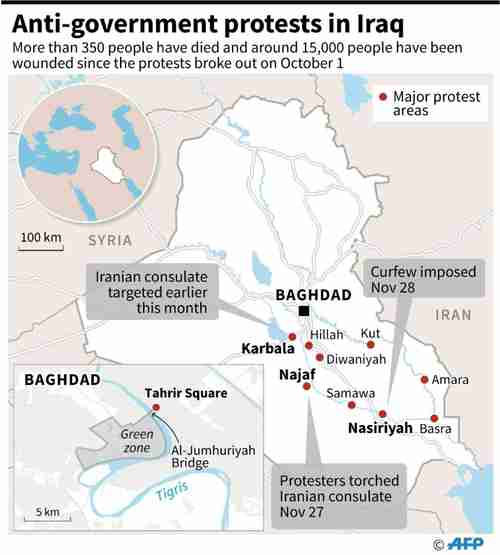 |
Increasingly violent anti-Iran and anti-government demonstrations and riots are spreading across numerous cities in southern Iraq. These are generational Awakening era riots following the Iran/Iraq war of 1980-89. The riots are mostly confined to cities in southern Iraq, which is the stronghold of the Shia Muslims, and the rioters are themselves almost entirely Shia Muslims.
So far, there is no activity by Sunni Muslims in Iraq. This is ironic, of course, since Iraq is a Shia Muslim country being attacked by Shia Muslim civilians in Iraq.
There was a bloodbath on Thursday, as 40 protesters were killed and hundreds wounded in the cities of Baghdad and Nasiriyah.
The unrest in Iraq began on October 1, when thousands took to the streets in Baghdad and southern cities. At least 350 people have been killed by security forces, which routinely use live ammunition, bullets, tear gas, and stun grenades to disperse crowds.
On Wednesday evening, there was a dramatic escalation when hundreds of anti-government protesters attacked the Iranian consulate in the holy Shia city of Najaf, setting the building on fire, and replacing the Iranian flag with the Iraqi flag.
This is the second time this month that an Iranian consulate was attacked. Three weeks ago, security forces killed four demonstrators who stormed the Iranian consulate in the city of Karbala.
One could say that Iran is getting what it deserves, since Iran has frequently allowed attacks on foreign embassies in Tehran as an instrument of government policy.
Since the riots began on October 1, demonstrators have been accusing the government of corruption, and have been protesting Iran's massive intervention in Iraq.
Iran's government has been demanding action from the Iraq government to stop the attack on Iran's consulates.
There have been some efforts by Iranian officials to meet with protesters to try to quell the demonstrations. However, this will never go well, because the protesters are young kids who are well aware that their grandfathers and grandmothers were attacked, raped, tortured, and killed by Iranians during the Iran/Iraq war.
Iran's foreign ministry spokesman Abbas Mousavi criticized Iraq's government's failure to prevent violence:
"The Iraqi government is responsible to secure safety of diplomatic missions and diplomats in Iraq... Tehran strongly condemns the attack and demands the Iraqi government's firm response to the aggressors."
A statement from the Iran Revolutionary Guard Corps (IRGC) suggests that Iran will take action of its own by using the Popular Mobilization Forces (PMF) to control the protesters. The PMF were formed in the past few years and were the principal paramilitary force used to expel ISIS from northern Iraq. However, the PMF are still around, and Iran is threatening to use them to attack the Shia protesters in southern Iraq.
This action by the PMF would certainly raise concerns that the Iran/Iraq war was starting all over again. That can't happen because both Iran and Iraq are in a generational Awakening era, but there could be a brief military clash.
As I described earlier this month, Iraq has a "confessional" form of government. ( "3-Nov-19 World View -- Anti-Iran, anti-government protests spread across Iraq")
The confesssional form of government was set up in both Lebanon and Iraq. Different governmental institutions are assigned, based on the sectarian affiliation or confession. In Iraq, the nation's resources and institutions are divided up among Shias, Sunnis and Kurds, to ensure free and equal citizenship.
In terms of preventing new rounds of sectarian violence, the confessional form of government seems to have worked. But unfortunately it makes corruption too easy, since officials in each "confession" have too much control over the funds, with no checks and balances.
The young Iraqis are now calling for an end to the confessional form of government, saying that it has permitted too much corruption. They particularly blame Iran's influence for the greatest amount of corruption.
Needless to say, the corrupt government officials in Iraq who have been using control of money and institutions to keep their cronies in power have no intention of letting this happen. But if the street protests continue and grow, they may have no choice.
The same thing is happening in Lebanon, where there are massive street protests, and calls for an end to its confessional form of government.
Both Iraq and Lebanon are client states of Iran, and these protests represent serious threats to Iran's foreign policy.
Sources:
Related Articles:
(Comments: For reader comments, questions and discussion,
see the Generational Dynamics World View News thread of the Generational
Dynamics forum. Comments may be posted anonymously.)
(29-Nov-2019)
Permanent Link
Receive daily World View columns by e-mail
Donate to Generational Dynamics via PayPal
Taiwan's separatists boosted by Hong Kong election
by
John J. Xenakis
This morning's key headlines from GenerationalDynamics.com
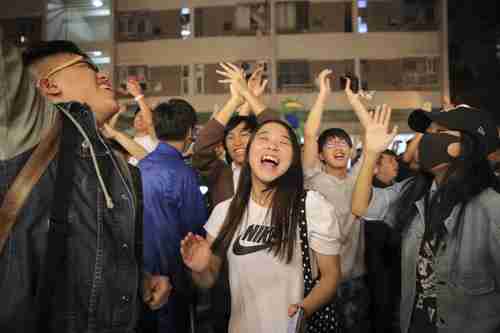 |
In what is being described as a historic election, pro-democracy activists in Hong Kong's Pan Democracy party have won a massive victory in electing members for local district councils. The elections had a record turnout of 71%, while similar elections in 2015 had a turnout of just 47%. Many of those turning out this time were young first-time voters.
Votes are still being counted. At this time (Sunday evening ET = Monday morning in Hong Kong), the pro-democracy parties have won 201 seats, while pro-CCP parties have won only 28 seats, with 12 seats for independents, out of a total of 452 seats. The other 221 seats have not yet been determined at this time.
Roughly speaking, it appears that pro-democracy parties will control 3/4 of the seats, whereas prior to this election they controlled roughly 1/4 of the seats. So this is a "historic" reversal at this level of government.
There have been some "stunning upsets," with well-established pro-CCP candidates Junius Ho and Michael Tien already losing their seats. These people have been harshly critical of the pro-democracy demonstrations, and have threatened jailing and violence of protesters, even peaceful ones.
In one sense it's only a symbolic victory. The district councils only control such things as parks and taxicabs. They are not as powerful as the city's Legislative Council, which controls the citywide government.
The difference is that anyone is permitted to run for the district council positions, while the only candidates that can run for the Legislative Council must first be approved by the CCP in Beijing. So the local councils are far more democratic, but the Legislative Council is anti-democratic, but far more powerful.
The huge victory follows five months of pro-democracy street protests, mostly peaceful but sometimes becoming violent. The pro-CCP camp had referred to a "silent majority" of voters who who would vote for their candidates, to show their rejection of the violence of the street protesters. But actually, violence worked both ways in this election. Some voted for the pro-CCP candidates because of the street protest violence, but there was also plenty of violence on the other side -- attacks on the peaceful protesters by police and by white-shirt "triad thugs."
These historic upsets are going to "put wind in the sails" of the pro-democracy activists in Hong Kong and the pro-separatists in Taiwan.
In Hong Kong, pro-democracy activists are now demanding that Carrie Lam finally respond to the five demands that the protesters announced months ago.
The first demand was the withdrawal of the "extradition bill," which would have permitted the CCP to abduct and arrest people in Hong Kong and bring them to the mainland for prosecution. Carrie Lam finally withdrew the bill, but only after several months of equivocation.
During that period, the activists expanded what they wanted to a list of five demands. The five demands are for the withdrawal of the bill, an agreement not to call the clashes of June 12 a riot, amnesty for those arrested on that day, a commission inquiry into allegations of excessive use of force by the police and a push for genuine universal suffrage.
It was thought that the CCP would never agree to any of these demands (except the first), but now activists are saying that the climate must change because of the overwhelming pro-democracy victory in Hong Kong, which refutes the CCP claim of a "silent majority" supporting CCP. The activists claim that this victory forces Carrie Lam to open negotiations on the remaining four demands.
The CCP could do a lot to defuse the situation in Hong Kong by permitting Carrie Lam to open those negotiations with the pro-democracy activists. But that would be the smart thing to do, and as I've written many times, the CCP always one incredibly stupid thing after another. We'll see, but my expectation is that the CCP will do something stupid that will make things worse.
Pro-separatists activists in Taiwan are taking note of the historic election in Hong Kong, and are hoping that they'll affect Taiwan's presidential race in January.
The CCP considers Taiwan to be part of China, and any move to declare Taiwan a separation nation would be an act of secession that would trigger a Chinese military invasion.
Taiwan's current president is Tsai Ing-wen, from the governing Democratic Progressive Party (DPP). Tsai is known to favor complete independence for Taiwan, although she always uses weasel words in talking about it, so as not to trigger a Chinese invasion. However, Tsai has spoken openly of her support for the protesters in Hong Kong, much to the displeasure of the CCP.
Tsai's opponent is Han Kuo-yu, who is the candidate of the Kuomintang (KMT) party, which favors merging Taiwan with China.
The CCP has been wooing Taiwan for years by saying that Taiwan could have a "one country, two systems" just like Hong Kong, and wouldn't that be wonderful? Tsai’s latest campaign advertisement makes the assurance that “Taiwan will not become Hong Kong”, while calling on voters to reject the “one country, two systems” model.
Thus, Sunday's elections in Hong Kong are thought to favor Tsai's re-election. The reasoning is that voters will see the overwhelming rejection of the pro-CCP candidates as supporting Tsai in Taiwan.
The CCP in Beijing is already close to full-scale panic over what's happening in Hong Kong and Taiwan. Sunday's vote will prove to the CCP that their worst fears and anxieties are coming true, and it may cause them to panic.
As I keep pointing out, the CCP has a record of doing one incredibly stupid thing after another. I don't know what the CCP will do about the situation in Hong Kong or Taiwan, but I can say with certainty that whatever they do, it will make the situation worse.
John Xenakis is author of: "World View: War Between China and Japan: Why America Must Be Prepared" (Generational Theory Book Series, Book 2), June 2019, Paperback: 331 pages, with over 200 source references, $13.99 https://www.amazon.com/dp/1732738637/
Sources:
Related Articles:
(Comments: For reader comments, questions and discussion,
see the Generational Dynamics World View News thread of the Generational
Dynamics forum. Comments may be posted anonymously.)
(25-Nov-2019)
Permanent Link
Receive daily World View columns by e-mail
Donate to Generational Dynamics via PayPal
Uighurs after 're-education': prison, death or enslavement?
by
John J. Xenakis
This morning's key headlines from GenerationalDynamics.com
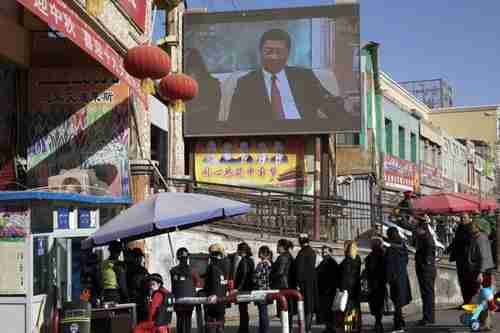 |
The NY Times has obtained a trove of hundreds of pages of leaked top secret Chinese documents containing details about the millions of Muslim Uighurs in East Turkestan (Xinjiang Province) have been rounded up, jailed, and treated harshly. The documents contain top secret statements by Xi Jinping and other top officials of the Chinese Communist Party (CCP).
The documents say that regions of Xinjiang have been given quotas for the minimum number of Uighurs to be arrested, with the directive to "round up everyone who should be rounded up." Once arrested, full dictatorial powers should be used against them, and they should be punished, even though there was no indication that they committed any crimes. The documents describe how one party official, Wang Yongzhi, was discredited and punished himself because he had objections to the abusive treatment of innocent Uighurs, and didn't round up and arrest enough of them to meet his quota.
The CCP has been conducting violent attacks at members of all non-indigenous religions, including Christianity, Buddhism and Islam. The attacks on Buddhism have been particularly violent and bloody, because of Buddhist presence in Tibet, and on Islam because of Muslim presence in Central Asia.
China's policies towards religions have always been violent, but before Xi's rise to party, the CCP described the terrorist attacks in Xinjiang as the work of a few fanatics. That all changed under Xi, who in essence has declared all Muslims (and, indeed, all Buddhists and Christians) as terrorists.
After a terror attack by Uighur terrorists in July 2014, Xi Jinping called for a “struggle against terrorism, infiltration and separatism” using the “organs of dictatorship,” and showing “absolutely no mercy."
"The psychological impact of extremist religious thought on people must never be underestimated. People who are captured by religious extremism — male or female, old or young — have their consciences destroyed, lose their humanity and murder without blinking an eye."
It's interesting that the leaked documents are revealing that Xi Jinping has found a way to blame the United States for Uighur terrorism in China:
"After the United States pulls troops out of Afghanistan, terrorist organizations positioned on the frontiers of Afghanistan and Pakistan may quickly infiltrate into Central Asia. East Turkestan’s terrorists who have received real-war training in Syria and Afghanistan could at any time launch terrorist attacks in Xinjiang."
Although Xi's comments were addressed to Uighurs, the same policies target Buddhists and Christians as well. In 2013, Xi issued "Document Number 9," which condemned those in the West who criticized China's violent crackdowns on Tibetan Buddhists and Uighur Muslims. Then, in April 2018, Xi adopted the "Sinicization of Religion," which triggered a rampage by China's security thugs, destroying Catholic and Protestant Churches, destroying Buddhist statues and temples, and jailing, beating and torturing anyone who tries to practice his religion.
The CCP has identified what it calls the "five poisons" of society that must be controlled or stamped out. These are Tibetans, Uighur Muslims, democracy activists, Taiwanese, and Falun Gong practitioners. These are the guiding principles of China's self-destruction.
However, in practice there are many more "poisons," according to the CCP, including Christians.
Another "poison" to be treated violently are the ethnic Hui people in Gansu province, in the heart of China. The Hui are not separatist, are not violent, are not terrorists. In fact, they're pure Chinese, except that they're not Han Chinese. But they're Muslims, and that makes them hated enemies of the state, and they're now being treated violently by the CCP, just like the Tibetans and Uighurs.
One of the mysteries of China's "re-education" program for Uighurs is: What happens to a Uighur after he's been "re-educated"? I've heard analysts on al-Jazeera and the BBC raise this question, but no one seems to have an answer -- or perhaps they don't want utter the obvious answers.
One analyst last week said that there was evidence that the prison population in Xinjiang prisons was increasing substantially. She opined that the Uighurs were being sent to prison after being re-educated.
Does that make sense to you, Dear Reader? It makes no sense to me at all.
The implication is that a bloodthirsty violent leader, Xi Jinping, ordered the state to spend tens of millions of dollars re-educating Uighurs, and then spend more tens of millions of dollars to pay for their room and board in prison. So that possibility doesn't make sense at all.
Another possibility is that the re-educated Uighurs are being killed. That's possible, since the same satellite photos that revealed the re-education centers also revealed adjacent crematoria. This would indicate the same kind of "final solution" that Hitler used to get rid of the Jews. And it's much more likely a scenario than just putting them in prisons.
However, the issue seemed to be solved in July, when Xinjiang Governor Shohrat Zakir announced that after the Uighurs had received their re-education, they were given good jobs with good incomes. (See my article: "31-Jul-19 World View -- China claims Muslim Uighurs released from concentration camps")
Does that make sense to you, Dear Reader? Actually, it does, as I described in my article. A bloodthirsty leader like Xi Jinping would use this work force of hundreds of thousands of Uighurs to do slave labor for China's military. As I described in my July article, that's what Hitler did.
So, millions of Uighurs (and Kazakhs) have been sent to concentration camps ("re-education centers"). Some were sent to prison afterwards, some were killed in the crematoria, and some were sent to work in slave labor camps.
That seems like the most likely set of scenarios to me. And yet, I've never seen or heard any mainstream media sources even mention killing or enslaving Uighurs.
I continue to be absolutely astonished that, after hearing politicians for decades say "Never again!", referring to the Nazi Holocaust against the Jews, that there are now three Holocausts currently in progress, in three different countries, all targeting Sunni Muslims:
What's perhaps most astonishing is that even the Sunni Muslim nations -- Saudi Arabia, Qatar, United Arab Emirates (UAE), Turkey, Egypt, Indonesia, and so forth -- are not saying anything about the three Holocausts, committing genocide and ethnic cleansing of their own brothers.
John Xenakis is author of: "World View: War Between China and Japan: Why America Must Be Prepared" (Generational Theory Book Series, Book 2), June 2019, Paperback: 331 pages, with over 200 source references, $13.99 https://www.amazon.com/dp/1732738637/
Sources:
Related Articles:
(Comments: For reader comments, questions and discussion,
see the Generational Dynamics World View News thread of the Generational
Dynamics forum. Comments may be posted anonymously.)
(18-Nov-2019)
Permanent Link
Receive daily World View columns by e-mail
Donate to Generational Dynamics via PayPal
Racial division in Latin America
by
John J. Xenakis
This morning's key headlines from GenerationalDynamics.com
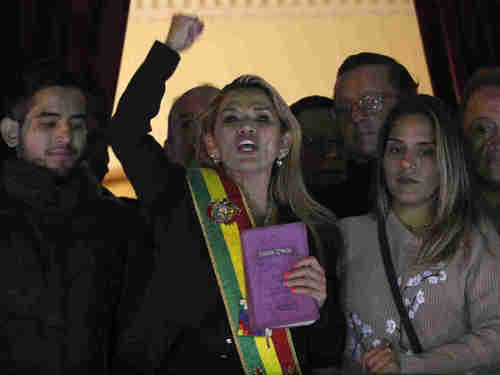 |
Bolivia's far-left President Evo Morales resigned on Sunday after nearly 14 years in power as the country's first indigenous president. The resignation follows a heavily disputed re-election on October 20, leading to weeks of riots and chaos.
Bolivia's army generals last weekend called for him to step down, after they fought angry anti-Morales protesters for weeks. On Sunday, Morales resigned on nationwide tv, saying he resigned willingly "so there would be no more bloodshed." He also said that he felt forced to stand down because his supporters and his family near his home in Cochabamba were being harassed, persecuted and threatened.
After resigning, he fled to Cochabamba, which is a stronghold of his indigenous supporters. From there, he has fled to Mexico, where he has been given asylum. Now Morales is calling the situation a coup.
Now the anti-Morales protesters are being met by pro-Morales protesters in the capital city La Paz and across the country. An opposition leader, Jeanine Áñez, has declared herself to be interim president, and has promised new elections.
Moreno's political party, Movement to Socialism (MAS), is evoking the memory of 1960s Marxist revolutionary Ché Guevara. Guevara launched a revolutionary coup in Bolivia in 1965. Guevara's guerrilla movement was defeated by the Bolivian army, and Guevara himself was killed on October 8, 1967, allegedly with the help of the United States. MAS today uses Guevara as a symbol for opposition to United States intervention.
As usual, racism is the dominating factor in Bolivia's society. Society is split between the descendants of the Spanish invaders, along with the mestizos, versus the indigenous groups, led by the far-left indigenous president Evo Morales. According to the CIA Factbook, the first group comprise 68% of the population, while the indigenous people are 20%.
Although the percentages vary, this same kind of European/indigenous split occurs in populations throughout Latin America. This is true of Peru, Chile and Ecuador, which all currently have widespread protests. The same is true of Venezuela.
A common thread running through all these countries is that the European descendant population is market dominant, while the indigenous population, often called Amerindians, is marginalized, with large disparities in wealth and income. Somebody ought to figure out why this always happens.
In Bolivia, Morales has been in power since 2006. The indigenous minority was marginalized under earlier leaders. Morales, the country's first indigenous leader, is credited with substantially improving Bolivia's economy, and particularly reducing poverty substantially among the indigenous population. This of course explains why the population of Morales in the indigenous population goes well beyond racial affinity.
(As an aside, it's worth noting that in this generational Crisis era, there are widespread protests not only in Latin America, but also in countries around the world, including Hong Kong, Iraq, Lebanon, Catalonia, Kazakhstan, Libya and Egypt.)
Today a major regional issue is that Morales is one of the few leaders in the world aligned with the Venezuelan thug Nicolás Maduro, who is flooding the entire region with millions of Venezuelan migrants who are fleeing violence and starvation. In some cases, Morales is deporting Venezuelans back to Maduro and Venezuela to be punished, which is increasing tensions in Bolivia.
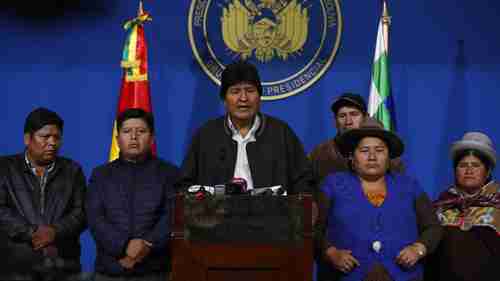 |
What Morales has done is similar to what I've seen in country after country in Africa. An African warlord comes to power, usually under a constitution that limits him to two terms. But he uses the time in office to take control of the courts and the main institutions, and uses corruption to illegally enrich all his cronies, so that the entire government is tied to him and dependent on him. Their wealth depends on the leader staying in power, and a new leader would expose them to criminal corruption charges and jailing. The leader uses torture, beatings, rape, and jailing of the opposition to make sure that he stays in power. This is standard fare in country after country in Africa.
Evo Morales has been in power since 2006. The constitution prohibited him from running for a fourth term in 2019. In 2016 he ran a national referendum to authorize his running for a fourth term, and he lost the referendum. The constitutional court, which is widely believed to have been corrupted by Morales, rejected the referendum result, so that he could run for a fourth term anyway, in the October 20 election.
It's also widely believed that Morales and his cronies have been corrupting the voting system during the last few years. When the election finally took place last month, the election commission stopped in the middle of counting the votes, when it appeared that Morales was going to lose. They started counting votes again the next day, and then suddenly Morales was winning. Subsequently, the Organization of American States (OAS) did an investigation and found numerous irregularities in the election, so they called for new elections. This lead to the protests and rioting, and Morales' decision to step down.
After fleeing to Mexico, Morales changed his mind and announced that his resignation was forced, and that this was a coup. This is not surprising since, as I described above, there are typically many of his corrupt cronies in government who would be subject to criminal prosecution under a new leadership, and they undoubtedly demanded that he rescind his resignation. Politicians in other far-left Latin American countries -- Venezuela, Nicaragua, Cuba -- are also calling the resignation a coup, and are demanding that he be reinstated. On the other hand, Brazil, Colombia and the United States are supporting the opposition leader, Jeanine Áñez.
Along with Morales, the next two successors, vice-President Alvaro García and Senate President Adriana Salvatierra, also resigned, leaving a power vacuum in Bolivia. There are fears of more riots and violence and that the army may step in to maintain order.
The situation in Bolivia today is febrile and chaotic, with continuing clashes between European and indigenous factions, and the possibility of greater violence.
Bolivia's history is dominated by its invaders -- various indigenous tribes, then the Incas, and then the Spaniards -- who enslaved them and used them to mine and extract minerals, for shipment back to Europe.
Bolivia gained independence in 1825 with Simón Bolívar's war of independence. The next generational crisis war was the War of the Pacific (1879-1884), where Bolivia lost its entire coastline to Chile, turning it into a landlocked country.
The next generational crisis war began in 1965 with a guerrilla movement mounted from Cuba and headed by Maj. Ernesto "Ché" Guevara, a well-known Argentine Marxist revolutionary. With the aid of U.S. military advisers, the Bolivian army smashed the guerrilla movement, and the crisis war climax occurred on October 8, 1967, when Guevara was captured and killed.
The death of Ché Guevara is still referenced today by Moreno's Movement to Socialism (MAS), and by indigenous activists in general, using it as a symbol for indigenous activism, and for opposition to United States intervention.
There is a serious fault line between the descendants of Spanish invaders + mestizos versus the indigenous groups. The tensions are growing, but I don't expect them to grow into a civil war, because it's too soon.
It's been only 52 years since Ché Guevara was killed, and so there are still many survivors alive today who lived through and remember that climactic battle and don't want to see it repeated. From the point of view of Generational Dynamics, the "58-Year Hypothesis" applies, which means that a full-scale civil war will not begin before 2025 (1967+58). In the meantime, there will be riots and low-level clashes in the next few days or weeks, but I expect them to fizzle reasonably quickly.
Sources:
Related Articles:
(15-Nov-2019)
Permanent Link
Receive daily World View columns by e-mail
Donate to Generational Dynamics via PayPal
Confessional governments in Lebanon and Iraq
by
John J. Xenakis
This morning's key headlines from GenerationalDynamics.com
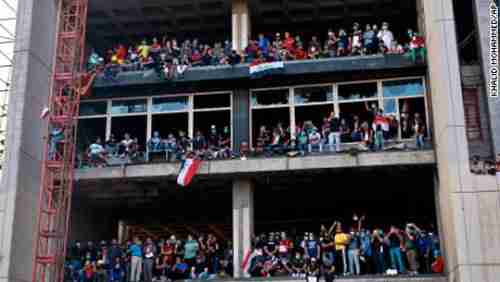 |
Tens of thousands of protesters gathered in the capital city Baghdad and cities across Iraq on Saturday to continue anti-government and anti-Iran protests that began in early October.
In the Umm Qasr port, which is in southern Iraq, south of the city of Basra, hundreds of people were wounded in clashes between security forces and protesters, as protesters set up blockades and burned tires to shut down the port. Operations at the port, which receives the vast bulk of Iraq's imports of grain, vegetable oils and sugar, have been at a complete standstill since Wednesday.
The protests are similar to those that I described last week in Lebanon. ( "21-Oct-19 World View -- Massive anti-government street protests paralyze Lebanon") Like Lebanon, Iraq is in a generational Awakening era, like America in the 1960s, following the Iran/Iraq war (1980-88), which was a Persian-Arab war. Today's protests are not sectarian (anti-Sunni vs anti-Shia) but are anti-government, and particularly against massive government corruption.
Most generational crisis wars in the Mideast occurred in the context of World War I and the collapse of the Ottoman empire.
Iraq's generational crisis war was the 1920 Great Iraqi Revolution, which was a watershed event in Iraqi history. It was not a sectarian (Sunni vs Shia) war. Instead, the entire country Sunnis, Shias, tribes and cities were united in fighting the British colonists.
Sixty years later, in 1980, Iraq's dictator Saddam Hussein launched an invasion of Iraq. This followed Iran's revolution in 1979, and Saddam thought Iran would be weakened for an easy conquest. Instead, Saddam's invasion united the Iranians.
The Iran/Iraq war was one of the longest and bloodiest wars of the 20th century. Chemical weapons and large-scale missile attacks were used. There were millions of casualties and refugees in both countries. This war had a profound influence on the entire Mideast.
Since then Iran has attempted to gain political influence in Iraq. The biggest opportunity came in the last three years, when ISIS was occupying much of Iraq, and Iraq's army was failing to eject them. Iran trained and funded Shia militias called the Popular Mobilization Units (PMUs), which played a major role in expelling ISIS from the country. This gave Iran a great deal of influence in the country.
There were generational crisis wars throughout the region in the 1970s and 1980s. The Iran-Iraq war pitted Arabs against Persians. Lebanon's civil war was related to Syria's civil war, which pitted Arabs against Shia/Alawites who, in turn, were aligned with Iran. Iran has enormous political influence in Lebanon through its puppet militia Hezbollah, which is the military arm of the Shias in Lebanon.
Iran and Syria came out of their respective civil wars with extremely bloody repression of their enemies. In Iran, Ayatollah Ruhollah Khomeini in 1988 ordered the torture, rape and massacre of tens of thousands of political prisoners and political enemies. In Syria, Bashar al-Assad is still conducting genocide and ethnic cleansing of his political enemies, the Arab Sunnis.
In my recent article on Lebanon, I described how Lebanon's constitution was written to split control of government institutions (prime minister, president, parliament) into three sects, Sunni Muslim, Maronite Christian, and Shia Muslim, respectively. The purpose of this form of government was to prevent the kind of violence that has occurred in Iran and Syria.
It turns out that this is called a "confessional system of government," where power is divided based on sectarian affiliation or confession. So after the dictator Saddam Hussein was ousted by the Americans in 2003, Iraq adopted a confessional form of government for the same reason.
The confessional form of government has worked fairly well in both Iraq and Lebanon, because it's prevented the kind of massive violence that's been occurring in Iran and Syria.
However, rioters in both Iraq and Lebanon are protesting against their governments for the same two reasons: First, corruption, the sectarian-based divisions give the sects too much financial power over their respective institutions, and allow them to steal as much money as they like. And second, Iran has too much influence, and the country is serving Iran's needs instead of its own.
Both countries are in extreme poverty, and protesters are giving both of those reasons as the cause.
Iran's dream for several years has been full control of the "Shia crescent" -- Iran, Iraq, Syria and Lebanon, including an open highway from Tehran to the Mediterranean Sea.
This is all falling apart now, with anti-Iran protests in Iraq and Lebanon, and loss of influence in Syria.
Winston Churchill's history of World War II describes the obvious "Gathering Storm" that preceded the war, making it apparent that war was coming.
Today we see a similar Gathering Storm -- regional wars, trade wars, surging xenophobia and nationalism in almost every nation, and in recent months a surge in street protests. Just today, Pakistan had to be added to the list of countries experiencing major anti-government street protests.
The street protests in Chile have been going on for months, and have forced Chile to cancel plans to hold two international conferences. One was an economic conference where Donald Trump and Xi Jinping were supposed to attend and sign a trade deal, and the other was a climate change conference.
As part of its coverage of the Chile street protests, the BBC did an interesting story on the spread of global protests.
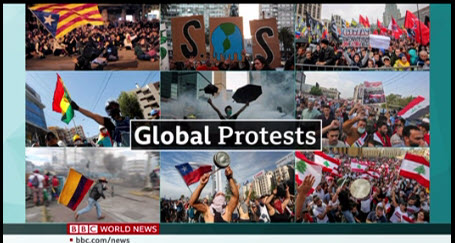 |
The BBC noted that the number of countries with large protests has grown dramatically in the last few months.
The BBC report provided a one or two sentence summary for each country. Here they are (my transcription):
All of the protests are based on worsening economies, and that's happening because the growing debt bubble days have largely ended, and so there is much less money in the world than there used to be, meaning that there are many more people who cannot get money to buy food with.
The world is being held together with duct tape and rubber bands, and at some point a rubber band will snap, and that will lead to the first declaration of war, and an escalating cycle of wars.
John Xenakis is author of: "World View: Iran's Struggle for Supremacy -- Tehran's Obsession to Redraw the Map of the Middle East" (Generational Theory Book Series, Book 1), September 2018, Paperback: 153 pages, over 100 source references, $7.00, https://www.amazon.com/World-View-Supremacy-Obsession-Generational/dp/1732738610/
Sources:
Related Articles:
(Comments: For reader comments, questions and discussion,
see the Generational Dynamics World View News thread of the Generational
Dynamics forum. Comments may be posted anonymously.)
(3-Nov-2019)
Permanent Link
Receive daily World View columns by e-mail
Donate to Generational Dynamics via PayPal
Web Log Summary - 2020
Web Log Summary - 2019
Web Log Summary - 2018
Web Log Summary - 2017
Web Log Summary - 2016
Web Log Summary - 2015
Web Log Summary - 2014
Web Log Summary - 2013
Web Log Summary - 2012
Web Log Summary - 2011
Web Log Summary - 2010
Web Log Summary - 2009
Web Log Summary - 2008
Web Log Summary - 2007
Web Log Summary - 2006
Web Log Summary - 2005
Web Log Summary - 2004
Web Log - December, 2020
Web Log - November, 2020
Web Log - October, 2020
Web Log - September, 2020
Web Log - August, 2020
Web Log - July, 2020
Web Log - June, 2020
Web Log - May, 2020
Web Log - April, 2020
Web Log - March, 2020
Web Log - February, 2020
Web Log - January, 2020
Web Log - December, 2019
Web Log - November, 2019
Web Log - October, 2019
Web Log - September, 2019
Web Log - August, 2019
Web Log - July, 2019
Web Log - June, 2019
Web Log - May, 2019
Web Log - April, 2019
Web Log - March, 2019
Web Log - February, 2019
Web Log - January, 2019
Web Log - December, 2018
Web Log - November, 2018
Web Log - October, 2018
Web Log - September, 2018
Web Log - August, 2018
Web Log - July, 2018
Web Log - June, 2018
Web Log - May, 2018
Web Log - April, 2018
Web Log - March, 2018
Web Log - February, 2018
Web Log - January, 2018
Web Log - December, 2017
Web Log - November, 2017
Web Log - October, 2017
Web Log - September, 2017
Web Log - August, 2017
Web Log - July, 2017
Web Log - June, 2017
Web Log - May, 2017
Web Log - April, 2017
Web Log - March, 2017
Web Log - February, 2017
Web Log - January, 2017
Web Log - December, 2016
Web Log - November, 2016
Web Log - October, 2016
Web Log - September, 2016
Web Log - August, 2016
Web Log - July, 2016
Web Log - June, 2016
Web Log - May, 2016
Web Log - April, 2016
Web Log - March, 2016
Web Log - February, 2016
Web Log - January, 2016
Web Log - December, 2015
Web Log - November, 2015
Web Log - October, 2015
Web Log - September, 2015
Web Log - August, 2015
Web Log - July, 2015
Web Log - June, 2015
Web Log - May, 2015
Web Log - April, 2015
Web Log - March, 2015
Web Log - February, 2015
Web Log - January, 2015
Web Log - December, 2014
Web Log - November, 2014
Web Log - October, 2014
Web Log - September, 2014
Web Log - August, 2014
Web Log - July, 2014
Web Log - June, 2014
Web Log - May, 2014
Web Log - April, 2014
Web Log - March, 2014
Web Log - February, 2014
Web Log - January, 2014
Web Log - December, 2013
Web Log - November, 2013
Web Log - October, 2013
Web Log - September, 2013
Web Log - August, 2013
Web Log - July, 2013
Web Log - June, 2013
Web Log - May, 2013
Web Log - April, 2013
Web Log - March, 2013
Web Log - February, 2013
Web Log - January, 2013
Web Log - December, 2012
Web Log - November, 2012
Web Log - October, 2012
Web Log - September, 2012
Web Log - August, 2012
Web Log - July, 2012
Web Log - June, 2012
Web Log - May, 2012
Web Log - April, 2012
Web Log - March, 2012
Web Log - February, 2012
Web Log - January, 2012
Web Log - December, 2011
Web Log - November, 2011
Web Log - October, 2011
Web Log - September, 2011
Web Log - August, 2011
Web Log - July, 2011
Web Log - June, 2011
Web Log - May, 2011
Web Log - April, 2011
Web Log - March, 2011
Web Log - February, 2011
Web Log - January, 2011
Web Log - December, 2010
Web Log - November, 2010
Web Log - October, 2010
Web Log - September, 2010
Web Log - August, 2010
Web Log - July, 2010
Web Log - June, 2010
Web Log - May, 2010
Web Log - April, 2010
Web Log - March, 2010
Web Log - February, 2010
Web Log - January, 2010
Web Log - December, 2009
Web Log - November, 2009
Web Log - October, 2009
Web Log - September, 2009
Web Log - August, 2009
Web Log - July, 2009
Web Log - June, 2009
Web Log - May, 2009
Web Log - April, 2009
Web Log - March, 2009
Web Log - February, 2009
Web Log - January, 2009
Web Log - December, 2008
Web Log - November, 2008
Web Log - October, 2008
Web Log - September, 2008
Web Log - August, 2008
Web Log - July, 2008
Web Log - June, 2008
Web Log - May, 2008
Web Log - April, 2008
Web Log - March, 2008
Web Log - February, 2008
Web Log - January, 2008
Web Log - December, 2007
Web Log - November, 2007
Web Log - October, 2007
Web Log - September, 2007
Web Log - August, 2007
Web Log - July, 2007
Web Log - June, 2007
Web Log - May, 2007
Web Log - April, 2007
Web Log - March, 2007
Web Log - February, 2007
Web Log - January, 2007
Web Log - December, 2006
Web Log - November, 2006
Web Log - October, 2006
Web Log - September, 2006
Web Log - August, 2006
Web Log - July, 2006
Web Log - June, 2006
Web Log - May, 2006
Web Log - April, 2006
Web Log - March, 2006
Web Log - February, 2006
Web Log - January, 2006
Web Log - December, 2005
Web Log - November, 2005
Web Log - October, 2005
Web Log - September, 2005
Web Log - August, 2005
Web Log - July, 2005
Web Log - June, 2005
Web Log - May, 2005
Web Log - April, 2005
Web Log - March, 2005
Web Log - February, 2005
Web Log - January, 2005
Web Log - December, 2004
Web Log - November, 2004
Web Log - October, 2004
Web Log - September, 2004
Web Log - August, 2004
Web Log - July, 2004
Web Log - June, 2004